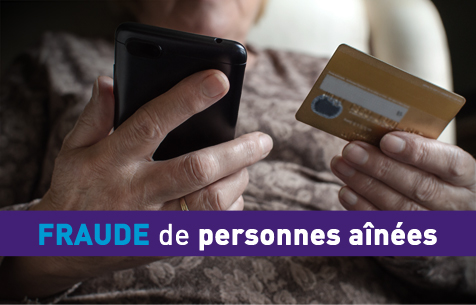Financial phone fraud (fake representative) Call for vigilance by seniors

29 july 2020
Since the beginning of fall 2020, the Service de police de la Ville de Montréal (SPVM) has noted that seniors are falling victim to financial phone fraud committed by fake representatives. For this reason, the SPVM is calling for vigilance by seniors and those close to them to prevent this type of fraud.
Modus operandi
The fraudster contacts the victim by phone and pretends to be an employee of a financial institution, such as an advisor or an investigator, or even a police officer.
This fake representative may be aware of some banking transactions carried out by the victim and refer to them in order to gain credibility and win the trust of the victim.
Once the connection is established, the fake representative explains to the senior person that they have been a victim of fraud and offers solutions to protect their assets and obtain new debit or credit cards.
Different stratagems
The fake representative uses different stratagems to prompt the victim to take action.
In addition, he or she asks the senior person to:
- convert their assets into cryptocurrency (e.g., Bitcoin) and send them to the fake representative to invest;
- pay back the amount of the presumed fraud by purchasing prepaid cards, e.g.: Google Play;
- send their credit cards with their personal identification numbers (PIN) to the fake representative to obtain new ones.
Sometimes, the fake representative even suggests that the victim puts their prepaid cards or debit or credit cards with the corresponding PIN in an envelope so that a person can come and collect them. The fake representative may also ask the victim to place this envelope under the outside doormat, in a letterbox or even offer to come and collect it in person.
Prevention tips
If you receive a call from a representative of your financial institution or a police officer, this person should already have all of your details at hand.
- Do not share any additional details with them.
- Do not systematically take what appears on your call display to be confirmation of the authenticity of the person calling. For example, some software can modify the display of real phone numbers.
- If you have the slightest doubt, hang up and check whether the call was genuine by directly contacting your financial institution or your police service.
- No police service, government service or financial institution requests fund transfers via cryptocurrency, purchases of prepaid cards or offers to come and collect cards from your home to pay back debts incurred as a result of presumed fraud or to protect your assets.
- Never hand over your credit cards or your PIN to anyone, for any reason, unless you go to your financial institution in person or you have personally called the police.
What to do in case of fraud or a situation appearing to be fraudulent
- Check whether the call is genuine; contact your financial institution via an official phone number.
- You should not feel ashamed if you are a victim: fraudsters are excellent manipulators. Report the incident.
To report fraud
- In an emergency, dial 9-1-1 to contact SPVM or your local police service if you live outside Montréal.
- Contact the Canadian Anti-Fraud Centre
at 1-888-495-8501 • antifraudcentre-centreantifraude.ca - If you are a victim of fraud or theft or if you have witnessed fraud or theft, contact:
- The Elder Mistreatment Helpline at 514 489-2287 • aideabusaines.ca;
- Info-Crime Montréal, on an anonymous and confidential basis
at 514 393-1133 • infocrimemontreal.ca.
- If the matter is not urgent but you wish to contact SPVM, you can directly contact your neighbourhood police station by dialling 514 280-01XX (XX corresponds to the number for the neighbourhood police station).
To find out more:
SPVM, Seniors Zone: https://spvm.qc.ca/en/Seniors



